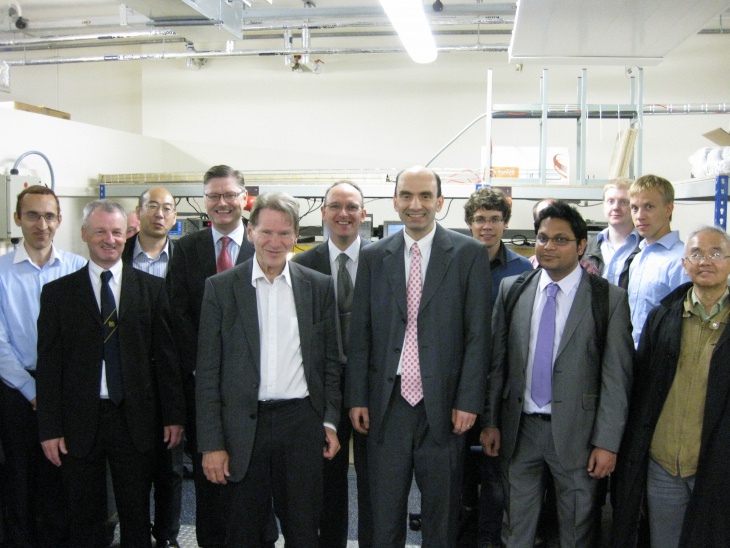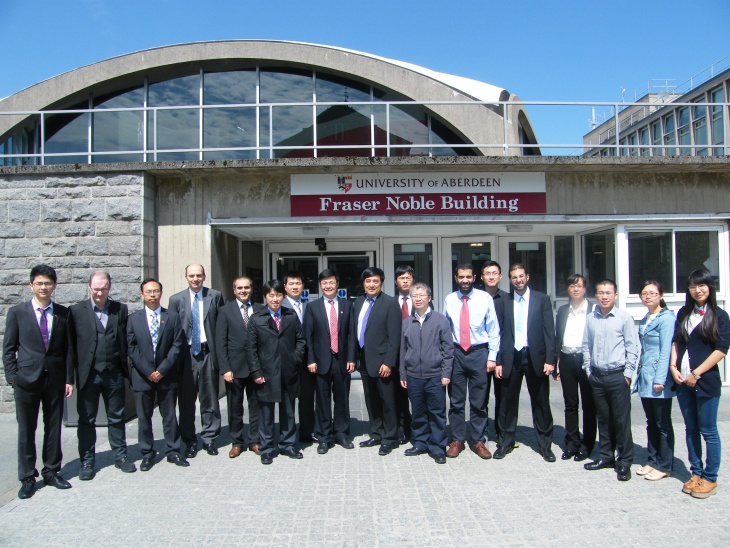
Chair in Engineering
- About
-
- Telephone Number
- +44 (0)1224 272336
- Office Address
School of Engineering, University of Aberdeen
Aberdeen
AB24 3UE, UKTel: 01224 272336
- School/Department
- School of Engineering
Biography
Education:
- PhD in Electrical Engineering from University of Auckland,1999,
- Diploma Engineer in Control Systems from University of Belgrade, 1993.
- Postgraduate certificate in University teaching from University of Ulster, 2003.
Employment history:
- Director, Aberdeen HVDC research centre, September 2015 - present
- Professor, University of Aberdeen, UK, August 2012 - present
- Reader, University of Aberdeen, UK, August 2011 - August 2012,
- Senior Lecturer, University of Aberdeen, UK, August 2008 - August 2011,
- Visiting professor, McGill University, Canada, July 2008- December 2008,
- Lecturer, University of Aberdeen, UK, September 2004 - August 2008,
- Lecturer, University of Ulster, UK, April 2000 – August 2004,
- Design Engineer, Beca Carter Hollings and Ferner, and Transpower NZ Ltd, New Zealand, 1998-2000
Academic administration:
- Member of senate, since 2016,
- EngD degree coordinator 2006-20015,
- Course coordinator (numerous courses), since 2000.
Publications:
External Memberships
Professional:
- Fellow of IEEE, class 2021,
- IEEE PES Distinguished Lecturer, 2015,
- Fellow of IET,class 2019,
- IET Chartered Engineer, 2018,
- CIGRE:
- Chairman of Working Group B4.76, 2017-2021,
- Member of Working Groups: B4.52, B4.58, B4.64, B4.80, B4.84, since 2009,
- IEEE Associate editor:
- IEEE Transactions on Power Delivery, since 2015,
- IEEE Access, since 2019,
- IEEE Power Engineering Letters, since 2015,
- CIGRE assiciate editor: CIGRE Science and Engineering, (B4 representative),
- Guest editor in Chief:
- IEEE Transactions on Power Delivery, Special issue on Frontiers of DC technology, 2016,
- IET Power Electronics, Special issue on DC grids, 2015,
- IEC standard SC 17A, IEC TS 62271-313: High-voltage switchgear and controlgear - Part 313: Direct current circuit-breakers - member,
- IEC standard SC 17A, IEC TS 62271-5: High-voltage switchgear and controlgear - Part 5: Common specification for DC switchgear. - member,
- IEEE standard P2880, Standard for HVDC Circuit Breakers Above 3200V - member,
Expert appointments:
- EU DG Energy expert:
- monitoring EU Project MIGRATE,
- monitoring EU Project COBRA Cable,
- EU Horizon2020, Horizon Europe, ERC
- Evaluation panel member, Grant application review
- EPSRC
- Grant Evaluation Panel Chairman,
- Grant application review
- Research project assesment/review for numerous research counsils worldwide,
PhD External Examiner:
Ecole Centrale de Lille (France), TU DELFT (Netherlands), University of Edinburgh (UK), Warwick University (UK), KTH Stockholm (Sweden), UPC Barcelona (Spain), Brunel University (UK). Cardiff University (UK), KU Leuven (Belgium), Durban University of technology (South Africa), Universite de Montreal (Canada).
Some photos from Aberdeen
CIGRE B4.52 meeting, Aberdeen, June 2011.
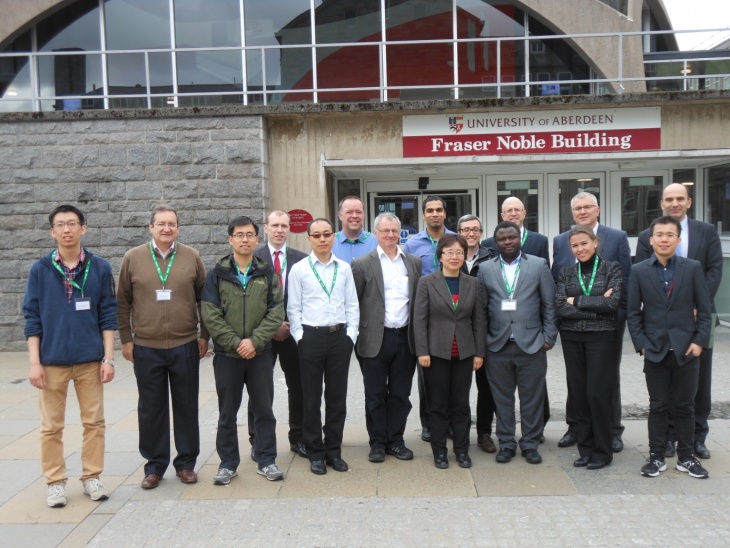
CIGRE B4.72 meeting, Aberdeen, April 2016.
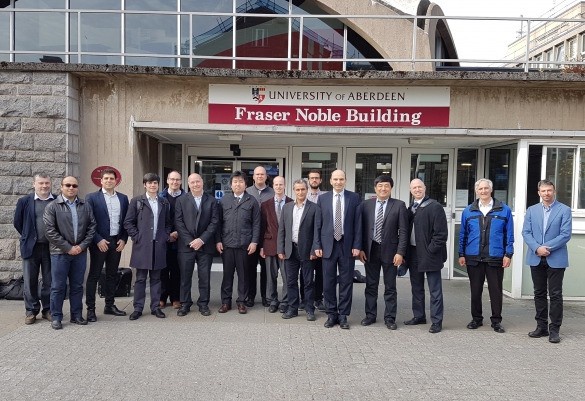
CIGRE B4.76 meeting, Aberdeen, April 2017.
EPSRC-NSFC project meeting, Aberdeen, June 2013.
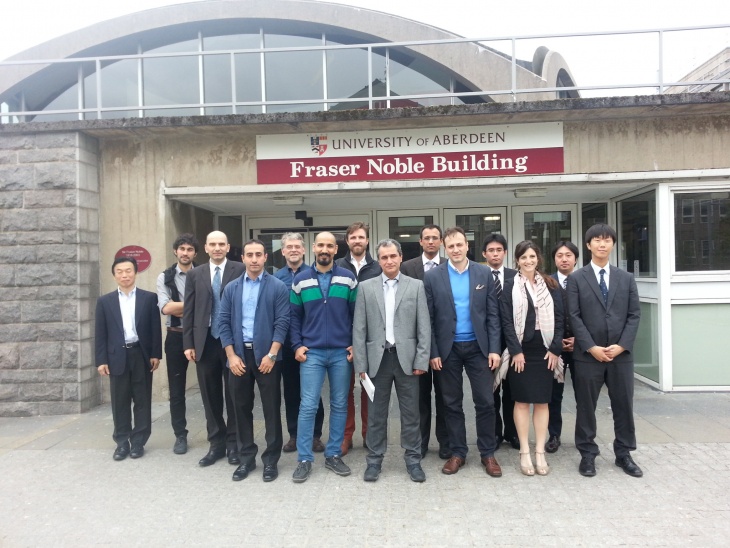
EU Project PROMOTioN, WP6 meeting, Aberdeen, June 2016.
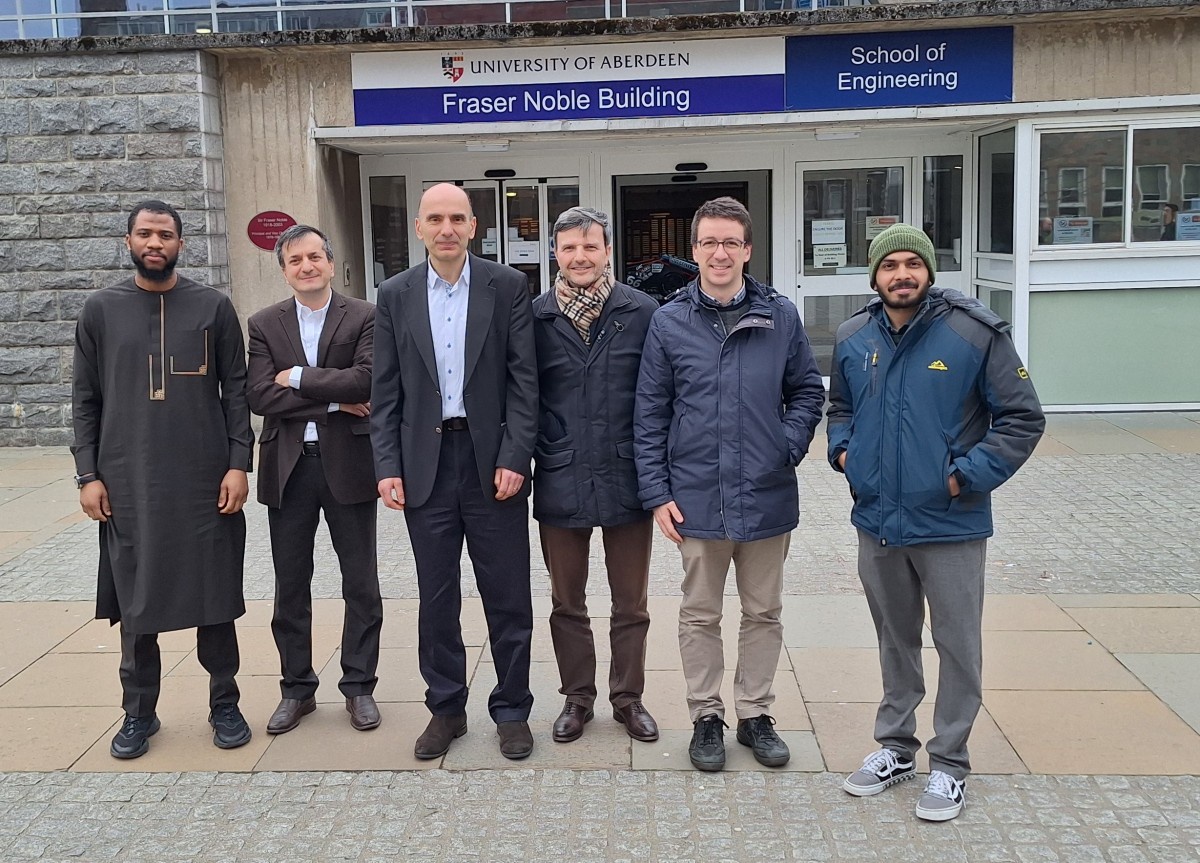
EU Project MISSION. WP6 meeting in Aberdeen, March 2024.
- Research
-
Research Overview
His research interests are in the areas of High Power Electronics, High Voltage Direct Current (HVDC) Transmission, DC transmission grids, Flexible AC Transmission Systems (FACTS), Interconnection of renewable energy, Power system modelling and control.
The DC transmission grid is the facilitating technology for large-scale offshore renewable energy deployment. Wind energy is predicted to be the largest source of renewable energy, as power generation industry transitions from fossil fuel and nuclear power plants. Most onshore wind energy has already been exploited while expanding onshore transmission infrastructure is very challenging. The contract price from the most recent offshore wind projects indicate that offshore energy has become competitive with other sources, even without subsidies. Offshore wind has the potential to offer solution for large-scale, long-term renewable energy supply.
While AC power transmission was dominant in 20th century, it is postulated that DC transmission will be prevailing in 21st, both at high and low power levels. The advantages of DC transmissions are numerous, and the recent advances in high power semiconductors facilitate cost effective voltage stepping and DC fault isolation. DC transmission grids have been a research topic for many years, and it is widely accepted that nowadays they are technically feasible. China is building the first large 4-terminal DC grid in the world (commissioning in 2021).
In the EU energy policy white paper (Green Deal, December 2019), Europe aims for net zero greenhouse gas emissions by 2050, where development of offshore wind is on of key directions for clean energy supply. The detailed studies by WindEurope indicate 380GW as the exploitable offshore wind in the North Sea by 2050. This is significant electrical energy, and a substantial increase from the existing 20GW installed offshore capacity, while UK has 80GW share which is larger than its peak installed generation capacity. The TYNDP (Ten Year Network Development Plan) by ENTSO-E (European Network of Grid Operators) foresees investment of €27bn by 2030 through 21 individual projects that would develop into a “Northern Seas Grid Infrastructure.
The electrification of NorthSea bed would help significantly towards decarbonization of the existing UK oil and gas exploitation and facilitate access to remote and marginal new sites. There are many new offshore industries emerging in the UK like: power generators offshore, power-to-x and various storage solutions (gas, hydrogen, compressed air, ..) that will all depend on reliable and flexible subsea power grid.
The DC grid technologies and operating principles will be significantly different from traditional AC systems. Most of DC grid components will be based on semiconductors (converters using transistors or thyristors), are in various stages of research/development, require advanced skills, and perform better: AC/DC converters (largely exist) replace traditional large generating stations, DC/DC converters replace AC transformers, DC Circuit Breakers replace AC switchgear, and Electronic DC hubs replace entire AC substations. Modfied wind generators with DC output and (integrated) DC/DC converters will be needed.
Current Research
- High Power DC networks,
- DC/DC conversion at MW powers,
- DC Circuit Breakers,
- High Voltage DC Transmission,
- Flexible AC Transmission,
- Wind energy,
- Integration of Renewable Energy,
- Power system modelling and control.
Collaborations
Some Institutions that collaborated on externally-funded research projects:
- Shanghai Jiao Tong University (SJTU) - China,
- Huazhong University of Science and Technology (HUST) - China,
- China Electric Power Research Institute(CEPRI), China,
- Ryerson Universty, Canada,
- McGill University, Canada,
- Universite de Montreal, Canada,
- CERN, Switzerland,
- Reseau de Transport D'Electricite, France,
- Ecole Centrale de Lille, France,
- ALSTOM,UK,
- Scottish and Southern Energy (SSE), UK,
- Strathclyde University, UK,
- Edinburgh University, UK,
- Glasgow University, UK,
- Heriot Watt University, UK,
- ABB, Sweden,
- Mitsubishi Electric, UK,
- TU DELFT, Netherlands,
- DNV-GL, Netherlands,
- Supergrid Institute, France,
- Numerous (39) partners on EU poject Promotion: https://www.promotion-offshore.net/
- Numerous (11) partners on EU poject MISSION:
Supervision
Research supervision experience
PhD students supervised to completion: Dr Stefan Kovacevic, Dr Mohammad Ishlah Haji Abdul Rahman, Dr Mario Zaja, Dr Jianxi Zhang, Dr Lu Zhang, Dr Aleisawee Alsseid, Dr Nicholas Strachan, Dr Ronny Sternberger, Dr Lisa Lamont.
Postdoctoral researchers supervised: Dr Stefan Kovacevic, Dr Mario Zaja, Dr Aliasghar Razikazemi, Dr Mohammad Azizian, Dr Mohammad Hedayati, Dr Ali Jamshidifar, Dr Mahdi Fazeli, Dr Huibin Zhang, Dr Weixing Lin, Dr Masood Hajian, Dr Mohsen Taherbaneh, Jonathan Robinson, Dr Mohamed Rashed, Dr Gopinath Pillai.
Completed
Under supervision
PhD
9
2
Mphil
2
0
Post doctoral fellows
17
2
Funding and Grants
External Research Income: Around £5.2 million.
EU Funded Research grants:
- EU Horizon Europe, MISSION (Low-emMISion HV and MV transmisSION components for AC and DC), WP6 participant, January 2024-December 2027, https://euprojectmission.net/ , Linkedin
- EU Horizon 2020, PROMOTioN (Progress on Multiterminal DC networks)”, WP6 leader, January 2016-June 2020, https://www.promotion-offshore.net/
- European Research Council, ERC, Starting grant, "Modelling platforms for high-power resonant DC hub and power networks with multiple converter systems", March 2011- September 2015.
EPSRC (Engineering and Physical Sciences Research Council) Funded Research grants:
- EPSRC grant no EP/K006428/1 and NSFC China, a consortium of 2 UK and 3 Chinese Universities, Principal investigator “DC networks with DC transformers for Integration of Large Renewable Sources”, June 2013-June 2016
- EPSRC grant no EP/H010262/1, and Ryerson University Canada, "Development of DC Transformer and Fault Current Limiter for High-Power DC networks", Principal investigator, December 2009- December 2012.
- EPSRC grant no GR/R11377/01: “Analytical Modelling of FACTS Elements”, Principal investigator, January 2001 - October 2003,
Scottish Funding council Major Research Grants:
- SE HGSO (High Growth Spin Out), Opportunity Qualification, LC DC Circuit Breaker, November 2022 - October 2023,
- SFC HORIZON and ERDF, Consortium of 5 Scottish Universities, "SHAPED –Scottish Hub for Advanced Power Engineering Design)" , June 2011 – June 2014
- Scottish Enterprise, "Prototype development for High Gain DC transformer" Proof of Concept award, January 2010 – July 2011,
- AU Knowledge Transfer Grant "High gain DC Transformer", 2007 - 2009,
- KTP in collaboration with PACT Engineering, "Development of Drivetrain for PIGASYS", September 2007 - September 2009.
Industry Funded Major Research Grants:
- RTE (Réseau de Transport d'Électricité, France) “State-Space Modeling of Complex Transmission Networks with multiple Converters" PhD project, March 2023 - September 2026.
- RTE (Réseau de Transport d'Électricité, France) “LCC and MMC dynamic interactions in subsynchronous domain" PhD project, January 2017 - July 2020.
- RTE (Réseau de Transport d'Électricité, France) “DC grids with full-bridge MMC and DC CBs” Post Doc fellow, September 2014 -December 2016.
- SSE (Scottish and Southern Energy) "Isolated multiterminal DC/DC converter for high power DC grids” “Post Doctoral fellow, January 2015- August 2016.
- SSE (Scottish and Southern Energy) "Optimisation of Moray Firth HVDC” “PhD studentships, February 2013-July 2016.
- RTE (Réseau de Transport d'Électricité, France) “Development of RTE NorthSea DC grid” Post Doc fellow, July 2012 -December 2013
Fellowships
- Royal Society, International exchange grant, In partnership with Univeristy De Montreal, July 2020 - August 2023,
- Royal Academy of Engineering, Global Research Fellowship and McGill University Canada visiting Professorship "Advanced Converter Systems for Thyristor based HVDC", July 2008 - December 2008.
Consultancy projects:
- Scottish and Southern Energy (SSE), UK, 2012-2013,
- Supernode, Ireland, 2019-2020,
- CERN (European Centre for Nuclear Research), Geneva, "Accelerator power supply modelling and control", 2003-2007,
- PACT Engineering, Scotland, "Drivetrain modelling for a PIGASYS robot tool", 2007,
Aberdeen HVDC Research centre laboratory
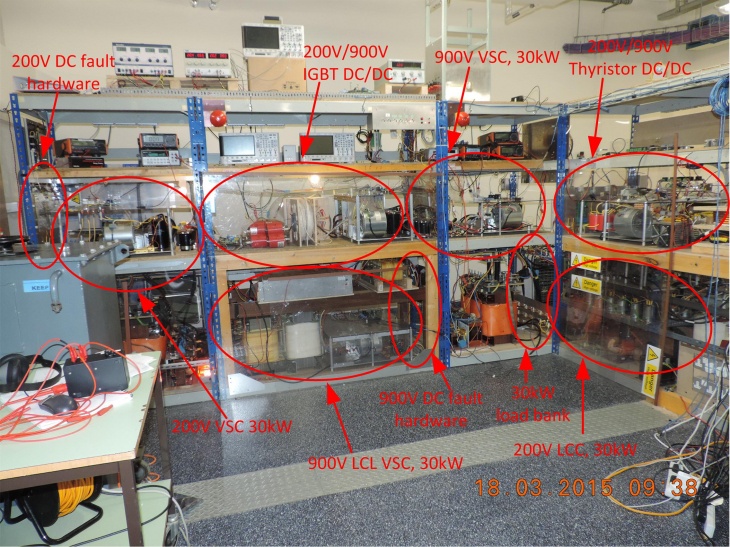
0.9 kV DC Grid demonstrator.

30kW, 200V/900V Thyristor-based DC/DC.
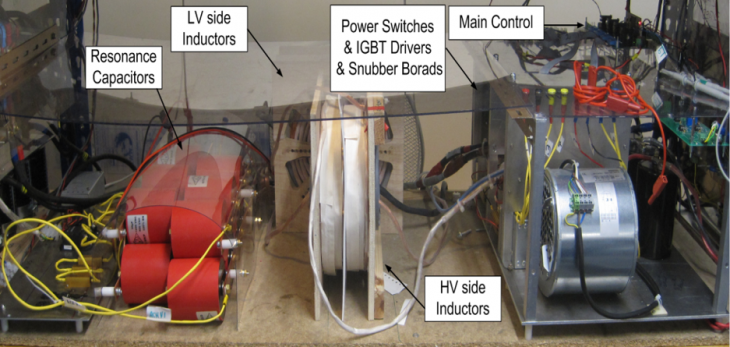
30kW, 200V/900V IGBT-based DC/DC.
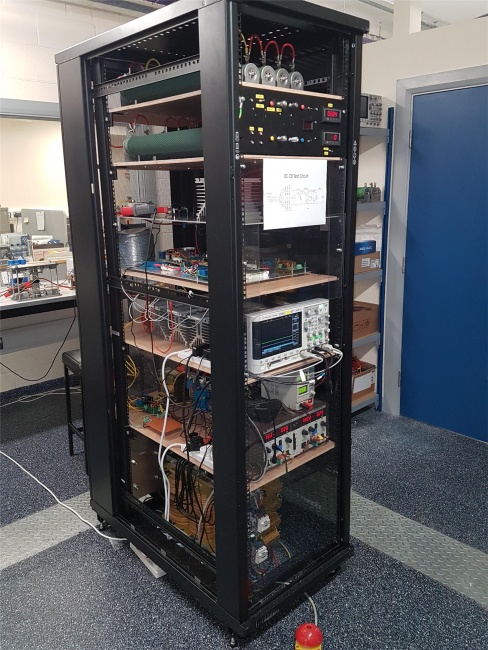
5kV, 2kA, DC Circuit Breaker test bench.
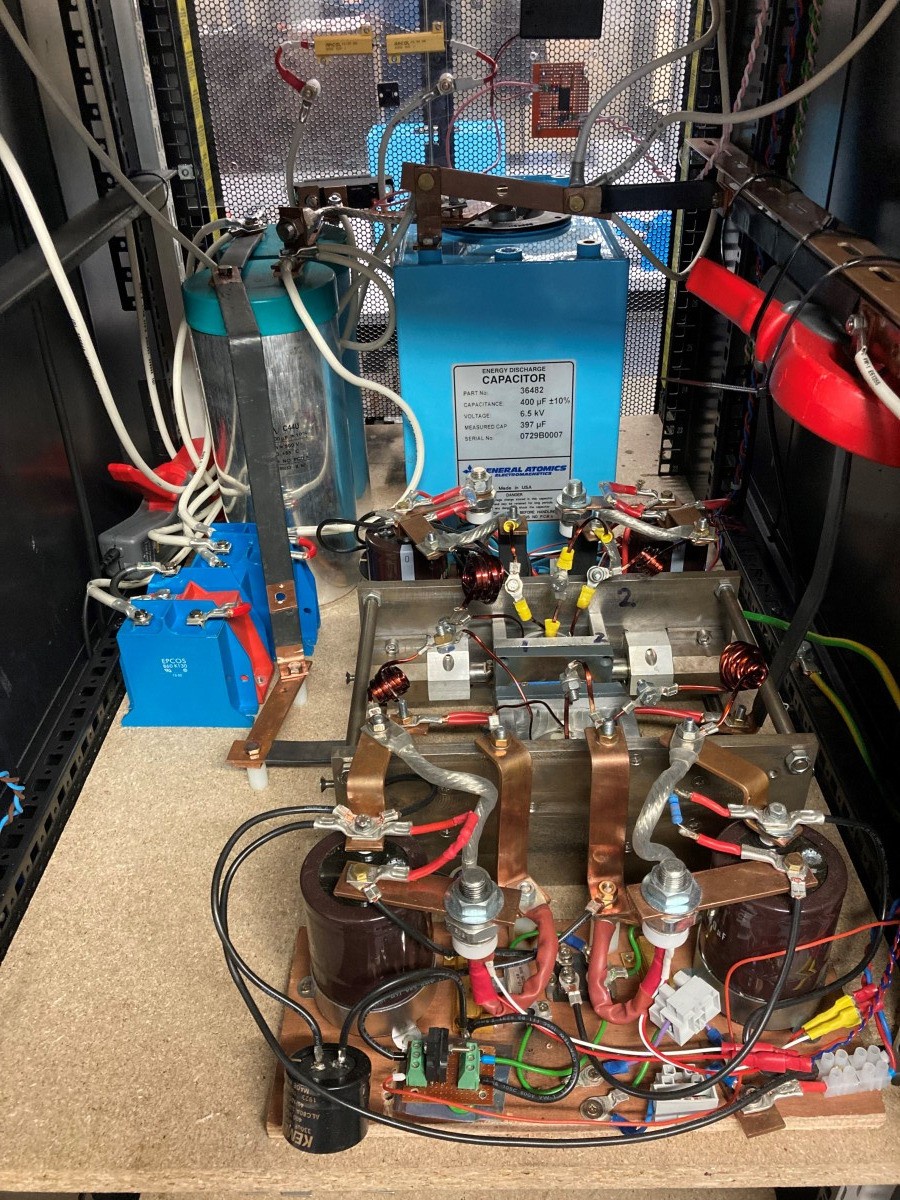
5kV, 2kA, LC DC Circuit Breaker with Precharged Capacitors.
- Teaching
-
Teaching Responsibilities
D Jovcic teaches Electrical Engineering year 3, 4,5 and postgradaute subjects:
- Electrical Power Engineering (EE3557),
- MEng Groudp Design (EG5565),
- Subsea Control (EG50F6),
- Engineering Project (BEng/MEng) (EG4013/EG4014),
Past courses:
- Control Systems (EE3043)
- Electrical Machines and Drives (EE40FD).
- Renewable technologies (Electrical) (EG50E2) and
- Power distribution and sustainability (EG55E1).
He was a coordinator for the professional doctorate degree (EngD).
- Publications
-
Page 4 of 7 Results 76 to 100 of 168
Optimal design of high power MMC-based LCL DC/DC converter
Chapters in Books, Reports and Conference Proceedings: Conference Proceedings- [ONLINE] DOI: https://doi.org/10.1109/PESGM.2016.7741886
Power flow algorithm based on current injections for analysis of multi-infeed VSC-HVDC system
Chapters in Books, Reports and Conference Proceedings: Conference Proceedings- [ONLINE] DOI: https://doi.org/10.1049/cp.2016.0351
- [ONLINE] View publication in Scopus
Distributed Power balance and damping control for high power multiport LCL DC hub
Electric Power Systems Research, vol. 129, pp. 185-193Contributions to Journals: Articles- [ONLINE] DOI: https://doi.org/10.1016/j.epsr.2015.08.013
- [OPEN ACCESS] http://aura.abdn.ac.uk/bitstream/2164/7803/1/R0617_Manuscript.pdf
Generic modularized analytical modelling of multiport LCL dc hub and multiport DC-DC
Chapters in Books, Reports and Conference Proceedings: Conference Proceedings- [ONLINE] DOI: https://doi.org/10.1109/PESGM.2015.7286095
- [ONLINE] View publication in Scopus
High Voltage Direct Current Transmission: Converters, Systems and DC Grids
Wiley-Blackwell, Chichester. 429 pagesBooks and Reports: Books- [ONLINE] DOI: https://doi.org/10.1002/9781118846704
Power balancing and dc fault ride through in DC grids with dc hubs and wind farms
IET, Renewable Power Generation, vol. 9, no. 7, pp. 847-856Contributions to Journals: ArticlesCirculating current suppression control dynamics and impact on MMC converter dynamics
Chapters in Books, Reports and Conference Proceedings: Conference Proceedings- [ONLINE] DOI: https://doi.org/10.1109/PTC.2015.7232762
- [ONLINE] View publication in Scopus
Phasor Model of Modular Multilevel Converter with Circulating Current Supression Control
IEEE Transactions on Power Delivery, vol. 30, no. 4, pp. 1889 - 1897Contributions to Journals: Articles- [ONLINE] DOI: https://doi.org/10.1109/TPWRD.2014.2372780
- [OPEN ACCESS] http://aura.abdn.ac.uk/bitstream/2164/4839/1/06977938.pdf
3-Level cascaded voltage source converters converter controller with dispatcher droop feedback for direct current transmission grids
IET Generation, Transmission & Distribution, vol. 9, no. 6, pp. 571-579Contributions to Journals: Articles- [ONLINE] DOI: https://doi.org/10.1049/iet-gtd.2014.0348
- [OPEN ACCESS] http://aura.abdn.ac.uk/bitstream/2164/4840/1/GTD_2014_0348.pdf
Offshore DC Grids as an Interconnection of Radial Systems: Protection and Control aspects
IEEE Transactions on Smart Grid, vol. 6, no. 2, pp. 903-910Contributions to Journals: ArticlesAnalysis and Hardware Testing of Cell Capacitor Discharge Currents During DC Faults in Half-Bridge Modular Multilevel Converters
Contributions to Conferences: PapersAverage modelling of medium frequency DC/DC converters in dynamic studies
IEEE Transactions on Power Delivery, vol. 30, no. 1, pp. 281-289Contributions to Journals: Articles- [ONLINE] DOI: https://doi.org/10.1109/TPWRD.2014.2321425
Fast modelling of VSC converters in a rotating dq frame for dc fault studies
Contributions to Conferences: PapersTopology assessment for 3 + 3 terminal offshore DC grid considering DC fault management
IET Generation, Transmission & Distribution, vol. 9, no. 3, pp. 221-230Contributions to Journals: ArticlesDC Transmission Grid with Low Speed Protection using Mechanical DC Circuit Breakers
IEEE Transactions on Power Delivery, vol. 30, no. 3, pp. 1383-1391Contributions to Journals: Articles- [ONLINE] DOI: https://doi.org/10.1109/TPWRD.2014.2371618
- [OPEN ACCESS] http://aura.abdn.ac.uk/bitstream/2164/4410/1/06960020.pdf
Demonstration of 30kW IGBT LCL DC/DC converter as proof of concept for interconnecting HVDC systems into a future DC grid
Chapters in Books, Reports and Conference Proceedings: Conference ProceedingsDistributed control for LCL DC hub enabling reliable energy transfer in future DC grids
Chapters in Books, Reports and Conference Proceedings: Conference Proceedings- [ONLINE] DOI: https://doi.org/10.1049/cp.2015.0035
- [ONLINE] View publication in Scopus
Investigation of interconnecting two Chinese LCC-HVDC through LCL DC/DC Converter
Chapters in Books, Reports and Conference Proceedings: Conference Proceedings- [ONLINE] DOI: https://doi.org/10.1109/APPEEC.2015.7380987
Modelling of High Power Mechanical DC Circuit Breaker
Chapters in Books, Reports and Conference Proceedings: Conference Proceedings- [ONLINE] DOI: https://doi.org/10.1109/APPEEC.2015.7381002
Modelling of VSC converters in the rotating dq Frame for DC fault study
Chapters in Books, Reports and Conference Proceedings: Conference Proceedings- [ONLINE] DOI: https://doi.org/10.1049/cp.2015.0014
- [ONLINE] View publication in Scopus
30kW, 200V/900V LCL IGBT DC/DC converter prototype design and testing
Chapters in Books, Reports and Conference Proceedings: Conference Proceedings- [ONLINE] DOI: https://doi.org/10.1109/ISGTEurope.2014.7028759
Interconnecting subsea DC collection systems into a high reliability DC grid
Chapters in Books, Reports and Conference Proceedings: Conference Proceedings- [ONLINE] DOI: https://doi.org/10.1109/ISGTEurope.2014.7028833
LCL and L-VSC Converters With DC Fault Current-Limiting Property and Minimal Power Losses
IEEE Transactions on Power Delivery, vol. 29, no. 5, pp. 2359-2368Contributions to Journals: Articles- [ONLINE] DOI: https://doi.org/10.1109/TPWRD.2014.2314481
MMC Converter detailed phasor model including second harmonic
Chapters in Books, Reports and Conference Proceedings: Conference Proceedings- [ONLINE] DOI: https://doi.org/10.1109/ISGTEurope.2014.7028946
Steady-state DC fault analysis of multiport DC hub
Chapters in Books, Reports and Conference Proceedings: Conference Proceedings- [ONLINE] DOI: https://doi.org/10.1109/EPE.2014.6911039
- [ONLINE] View publication in Scopus

